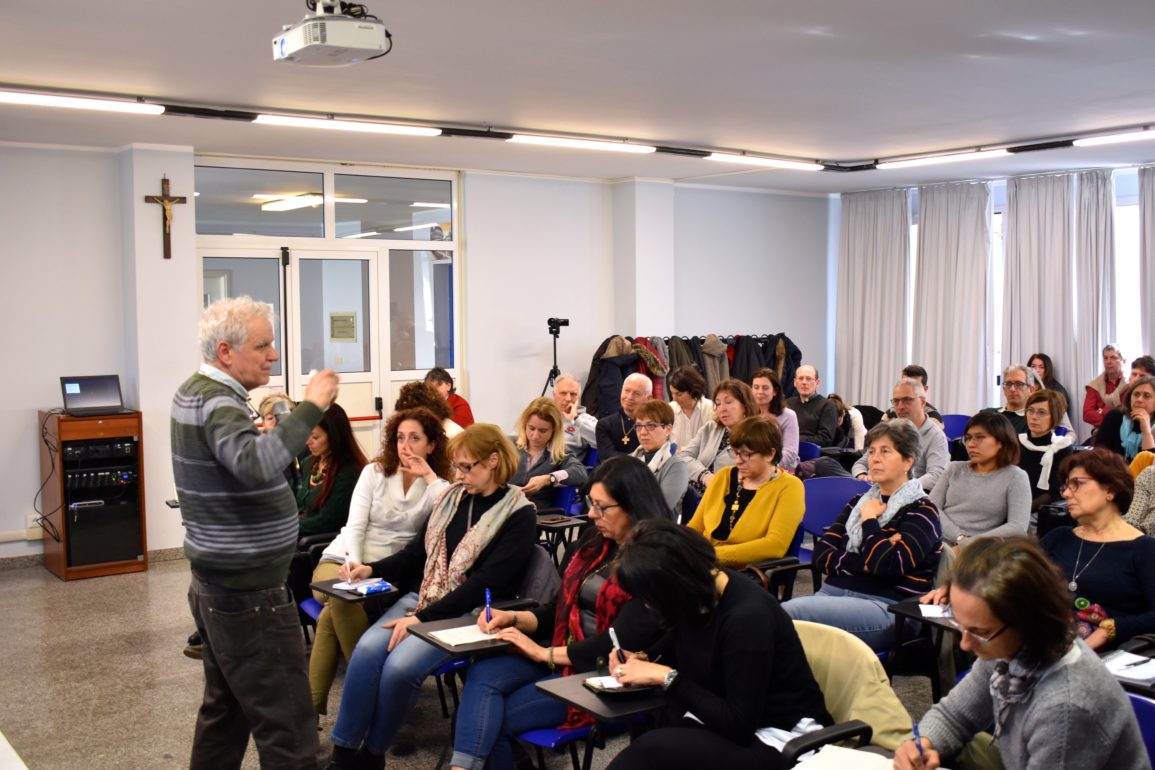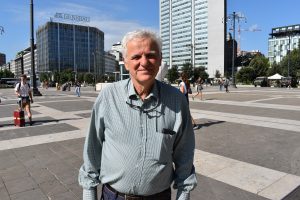In this interview, psychologist Ezio Aceti reflects on the importance of understanding adolescents today, pointing out a series of values and suggestions, which must be given to young people, to help them grow free with a capacity for listening and for self-reflection.
Ezio Aceti, married, with two children and two grandchildren, has always been involved in education and the psychology of children and adolescents. He was the Director of a Center for Professional Formation and Scientific Coordinator of centers for the seriously handicapped. He has opened psycho-pedagogic centers of listening in kindergartens, primary and secondary schools, and Bachelor degrees addressed to parents and professors. Together with other psychologists, he founded the Parvus Association, involved in child therapies and the support of parents in the education of their children.
* * *
Today’s world privileges relationships, empathy, and emotions, thus facilitating a more open type of person, sensitive to everything. How can one know and educate this new type of man, especially in his childhood and adolescence?
This discovery the world has made is very beautiful because it sheds light on our whole emotional, affective and relational world. Jesus was a passionate person, with a personality that not only attracted irresistibly, but He also lived with others. So our faith and our way of believing must not only be rational but must especially involve the whole person and all people. We must realize that a new type of man is being born, the empathetic and relational man.
However, educators are not yet able to understand this new man; they are above all adolescents, who live immersed in this world, the first to have to deal with this explosion of emotions. Emotions abound today; they are neither positive nor negative, but simply a stupendous energy that envelops our kids and that, well channeled, can create men able to establish relationships with everyone, shaping, so to speak, the “world man.” However, we are faced with a problem: the emotions are so many that it’s hard for adolescents to manage them, to control them and so, lamentably, in many cases, they bow to emotional dependencies, addiction to the social networks or drugs. So, the question is: What can be done? In the first place, not to demonize the emotions; it’s better to educate them.
In face of change, the answer is always educational. I offer three concrete proposals here:
The first is that the education of the emotions is worked on from the infant school. All children must know what emotions are, how to manage them, and how to use them.
The second suggestion is relational education, which should encompass the period of primary school onwards. We need to have children understand that the future points to the building of relationships with everyone, knowing that truth is not only on one side but in relation with others.
The third educational proposal consists in helping our adolescents to detect the danger inherent to dependence on emotions because, they must be able to control them, otherwise they take power.
If we understand this coming man well, it’s a wonderful thing; he is the empathetic relational man.
An unimaginable quantity of news, messages, videogames, programs, chats have appeared, overwhelming the customs and traditions of the past. Changes that quite frequently have left young people without time for other activities, or present new patterns or lifestyles. In the face of these new habits, what adequate answers can be given to adolescents’ urgent questions about freedom?
Thank you for this question, because freedom is a human being’s highest value. Who is a free person? A free person is one who feels some things in his interior, thinks intelligently about what he feels, and then, with his intelligence decides what is right or wrong to do.
Young people need this type of freedom, which has its strong and weak points. What are the points of fragility? The point of reflection; they are so bombarded by information and ideas that it’s hard for them to deepen in things. They live them in a superficial way, not because they don’t want to be profound, but because we haven’t taught them to go deeper. Then, something we have to do as adults is to teach them the capacity to listen and self-reflect; we must give them this.
The second aspect is that there is no freedom if there are no points of reference. Here, looking at Christian education, it’s important to analyze how Jesus’ figure and values are presented. It’s not enough to say to young people today that they are in God’s image; they don’t understand this. It’s not enough to say they must behave well, this doesn’t mean anything to them . . .
Instead, we must make reference to the values that are already present within them. What are these values? The first thing is to remind them that they are relational beings; that they can’t live without one another. The second thing is that within them, they are already programmed to love, to do good and that if they follow this program, they will be free. The third value is that they are able to realize that real, true things give joy and false things cause sadness. When an adolescent is truly happy it’s because he’s experienced something true. The fourth value is the ability to recover; there is, within them, the possibility to begin again and, the fifth important value is to revive in them the desire for “something greater,” the transcendent desire, because when one is free one feels this desire more and increasingly.
Freedom isn’t static; it’s life’s substance, it leads to discovering new things but always respecting the values one has within.
Sexuality speaks of a difference: man and woman, which conditions a person in his/her totality, including the emotional dimension — a topic of great debate given the gender ideologies and inclusive language. In face of these offers of happiness, how can young people be enticed to the beauty of true love and human sexuality?
Let’s take a guideline from this beautiful question. In the first place, let’s stop seeing the negative everywhere. Let’s stop thinking that to speak of gender is pure poison, let’s stop thinking that homosexuality is against who knows what … Everything that concerns the human being, has potentialities that must develop well, together, certainly, with the risks of obscurity and negativity that it entails.
When we speak of sexuality, we must have a clear idea of what sexuality is. The human being’s sexuality is expressed in all the dimensions of his/her person: body, psyche, and spirit. It’s the fundamental principle of identity. Sexual education is education for the whole person. The “gender” concept is born with a possibly just reason, given that the fact of distinguishing between man and woman had been used badly up to now. For example, we can mention violence against women, or “machismo” also present in this Church which I love, so much so that even Pope Francis has witnessed it. However, the evolution of gender ideology has taken a wrong path, seeking the suppression of any distinction between man and woman. The gender theory states: “but if to be man and woman creates so much difficulty, creates differences, creates violence, then it’s something mistaken,” affirming also that “sexuality is only the result of education,” which is true but not altogether . . .
True sexual education occurs from the fifth to the seventh year with sexual identity when I, as a man, am happy with myself as a man and a woman is happy being a woman. This is the first concern we as parents, as educators, should have: that children be happy for being what they are, a boy or a girl.
Sexual orientation is different. It occurs, generally, in pre-adolescence and adolescence, where at some moment a child, invaded by all the impulses of adolescents, can feel an attraction for a child of the same sex, but this doesn’t mean that he is a homosexual or she a lesbian. It means that these emotions still need to be channeled and governed. My clinical experience tells me that if we wait for the opportune moments and do not catalog a boy or girl that feels a homosexual attraction, but help them little by little to know and govern their emotions, this apparent homosexual experience becomes heterosexual, namely, he/she moves towards his/her true identity. The most important thing in adolescents is to help them become the owner of their emotions.
It could happen that someone in adult age and master of his emotions can feel an attraction to persons of his same sex . . . Then, what happens? We won’t go to Heaven for the sexual orientation we have; we will go to Heaven because we have passed the glass with water to the other. I have never found in the Gospel that I’ll go to Heaven because I believe in God; Jesus doesn’t ask me this; He doesn’t even ask me if I am Muslim, Christian or if I have sexual tendencies. He asks me if I fed the hungry, clothed the naked . . . that is, if I’ve loved the person. We go to Heaven because we love man. It’s by loving man that I reach God. This Pope, who is brilliant, says that I must touch Christ’s flesh, which is my brother’s flesh, to touch God.
We must educate our young people in the beauty of affection and human sexuality. The gender ideology does away with diversity, a terrible error. We must use this diversity better, witnessing that the very beautiful unity and complementarity between man and woman reflect God’s beauty. The Church is finally opening . . .
How can an educator, parent, or catechist present morality to young people as a help on the way and not a burden?
I think the contrary must be done to what has been done up to now, not because those that preceded us made a mistake, but because they didn’t have sufficient light. The first who inspires man’s evolution is the One who created him, God. God is giving us the light to understand the whole of man’s evolution. He is making us understand that morality serves to liberate a person; it’s not a burden; there isn’t any prohibition. God is not the God of fear; He is the God of love, of openness, of courage. To speak of morality by terrifying man is to make use of moralism, which is a degenerated morality. True morality is to look at man and to show both the beauty that is within the human being as well as the beauty there is in affection, in sexuality, in love . . . that a youth enamored with this beauty may become a master and owner of all his instincts and all his emotions. A catechist, an educator must be enamored with man, in love with God, have a personal relationship with Jesus, and impose himself on young people by presenting God’s beauty to them.
We have always thought that to sin is to offend God; however, when one sins, man offends himself because God is, in His essence, exclusively love and light. God is here to support us, especially when we have grave situations; He is the beauty of everything. Then true morality is to start out toward the human height that God asks of us. We must translate God’s great truths into simple words so that our children and young people will go to church because they feel attracted by Jesus, by His love.
Translation by Virginia M. Forrester











